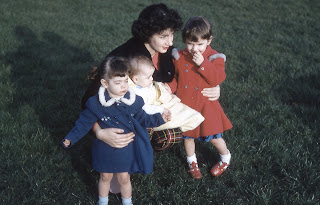Whether we like it or not, extended family and in-laws are part of
our lives. So having a good relationship
with them is vital. I tell women all the
time, you didn’t just marry him, you married his whole family. Spending time with your husband’s family, or
even your own extended family, can be full of blessings, but it can also be the
source of a lot of stress. Sometimes
in-laws seem more like outlaws.
Some of us have an excellent relationship with our in-laws (okay
maybe 3 of us), but I think for most of us, frustration, aggravation, hurt
feelings, and just plain misunderstandings get in the way of having anything
that even resembles a decent relationship.
We get stuck between the wanting to make things better and wanting to
throw up our hands in defeat, stuck between the hope of the Norman Rockwell
painting and the reality of our lives.
I have been married for 30 years and have known my husband and his
family for 34 years. I would love to
tell you that given time, things will get easier, relationships with extended
family will get better, but that is not true.
Time does nothing but compound unresolved problems. It is like walking with a small stone in your
shoe. If you don’t stop walking, get the
stone out before continuing, you are going to have pain, soreness, and maybe
even a wound that leaves a scar.
So, let me share with you the top 10 things you can do to change
your in-laws, making them better people so your life will be much better. Number 1……...
Did you actually think I had 10 things? The reality is there is nothing you can do to
change anyone…besides you. It is you
that I will challenge you to work on and in doing so I can promise that it will
make your relationship with your in-laws better, not perfect, but better. By the way, it will also improve all of your
relationships.
If there is anything I would like for you to know about me, it is
that I try to live my life to honor God and follow His Word, the Bible. The charge I give you here is from Scripture,
but even if you are not familiar with God’s Word, or accept it, this can still
be a valuable understanding, so stay with me.
We older women are told in Titus 2 to teach the younger women to
be kind. Kindness and goodness are two
of the gifts of the Spirit for Christians, talked about in Galatians 5. There is a difference between kindness and
goodness. Kindness is the sincere desire
for the happiness of others, and goodness is the activity planned to advance their
happiness. We must practice kindness
and goodness. It will change our
perspective, it will change our motivation, it will change our reaction to
things and others, and it will change our behavior.
In order to practice this kindness and goodness we have to realize
the things that hinder them. The number
one thing that hinders kindness and the plan for goodness is anger. And this anger is not something external, it
isn’t something that someone else causes (“she makes me so mad”), it comes from
within. When you are squeezed, what
comes out is what is inside. Anger is
something we choose to do; therefore we can also choose not to be angry. When we get angry it is almost always because
we are not getting our way, things aren’t being done our way, or in our time
frame. We want our desires satisfied
more than we want to honor God or to honor our husband and family.
Hindrance number two is bitterness. This one is hard because everyone is going to
wrong us, either in small ways or big way, because let’s face it, we are all sinners. And in these moments when things are done and
said that inflict pain, whether intended or not, we have to guard against
bitterness. We like to use words like “hurt
feelings” but hurt feelings soon morph into bitterness. We review the offense over and over in our
minds, wallowing in self-pity, and telling ourselves we have a right to this
bitterness. Instead of dwelling on how
we have been wronged, let’s extend the same grace and mercy we so readily
expect from others and are do graciously given by God.
One more hindrance to our pursuit of kindness and goodness is
judging. That’s right, we pass judgment
and make negative assumptions about others, often only to discover later how
wrong we were. It is so easy to see what
is wrong with someone else, to notice their faults, and this is especially true
of someone that we are already at odds with.
Why not think the best of someone else, assume there is a “good” reason
for their behavior, even when we can’t see it right away.
The truth is, if we want a better relationship with our in-laws
(or our own extended family), if we want to know how to cope with the stress
involved each time we are together with them, it is our own behavior that we
should be working on and focusing on to change and improve. Choosing not to be angry and being okay when
we don’t get our way. Understanding that
people are going to say the wrong thing, do the wrong thing, and hurt us. We get to make the choice not to be bitter,
but to overlook the wrong and offer grace and mercy that we so desperately
want. And it is up to us to begin
thinking the best of our mothers-in-law, fathers-in-law, siblings, moms, dads,
and all the other people that make up the world that is called “our family”. You aren’t responsible for their behavior,
but you are very much responsible for your own.


Such wisdom. Thank you, Joann... again~ Debby
ReplyDelete